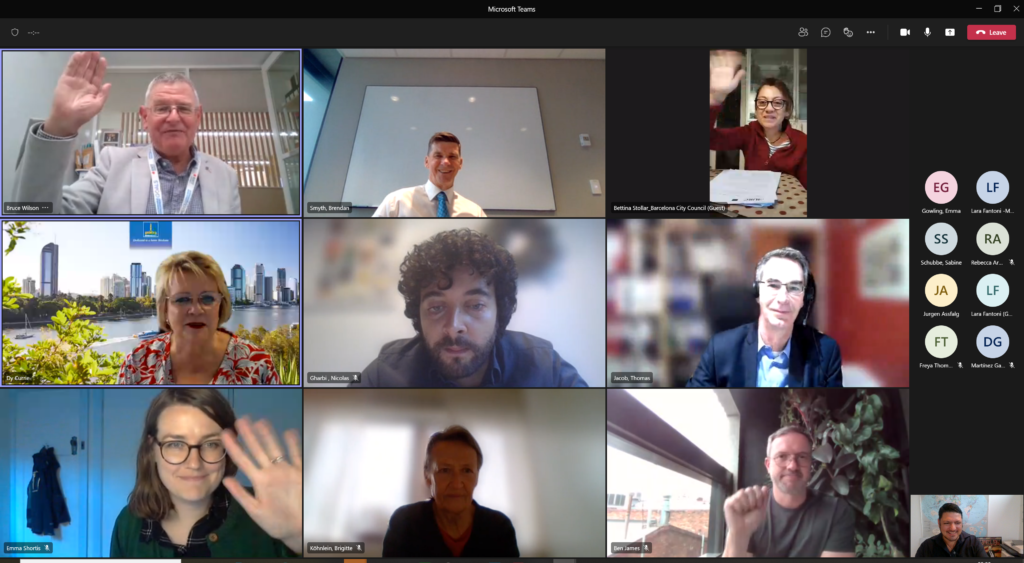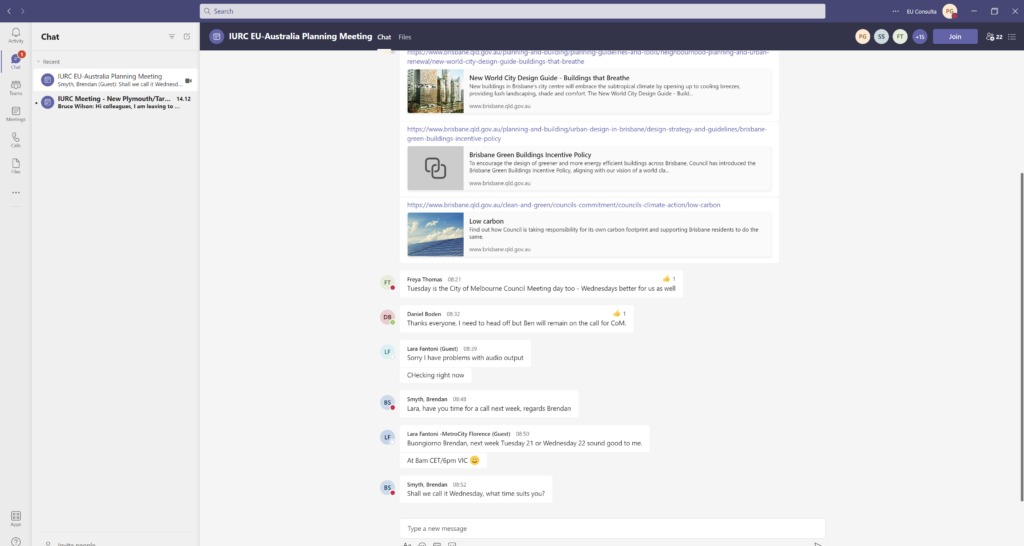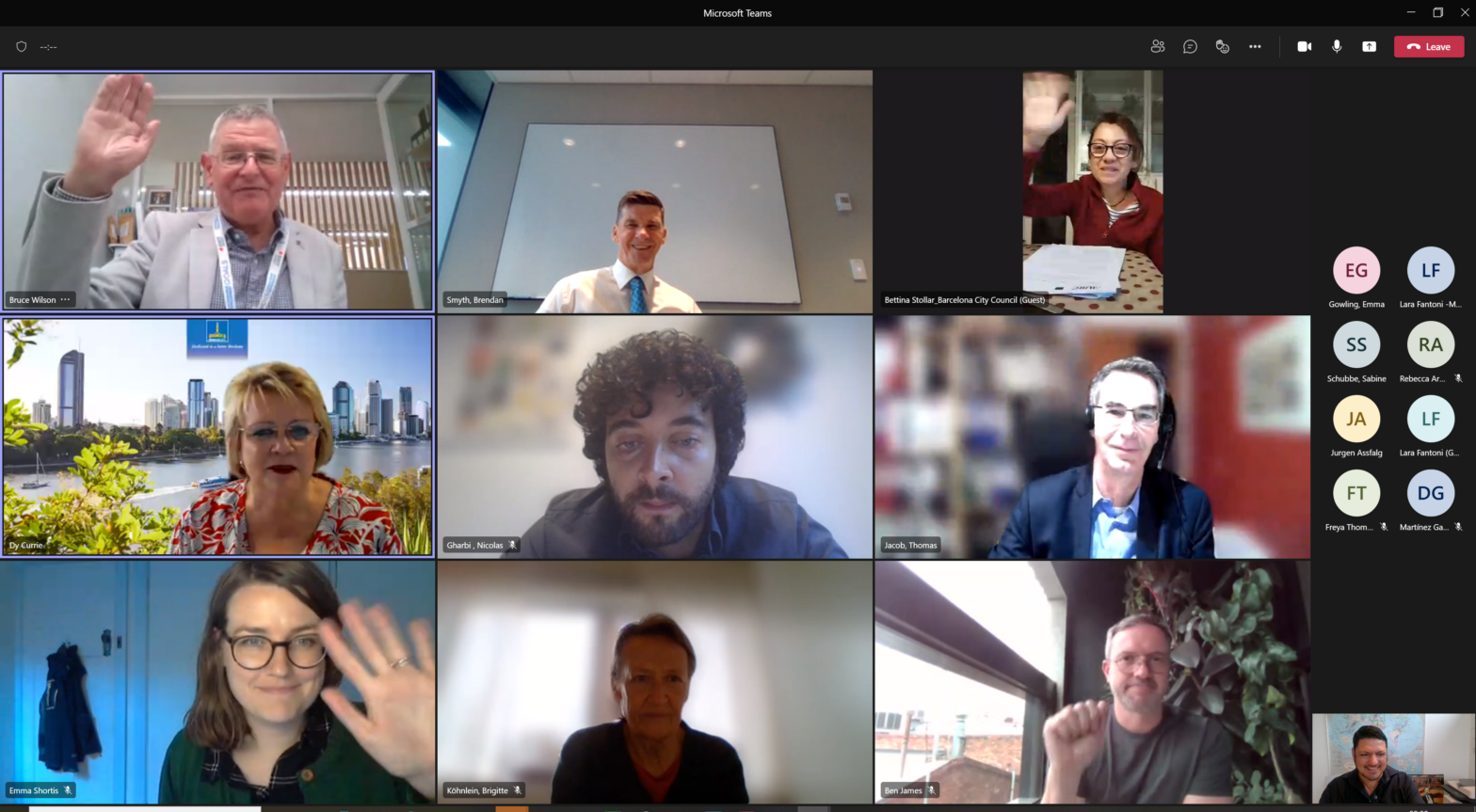The four European and three Australian pilot cities met online to crystallise where substantive work will start in the new year. Whereas the city pairings were confirmed, it was agreed that during the 1st half of 2022 cities would work together in thematic groups, involving experts according to the needs and demands. Herefore, the IURC project team proposed a series of specific meetings on each thematic area, beginning in mid-February 2022. By the end of March, each city should have a good idea of their specific areas of interest and how they can connect with others, thus facilitating pairings.
At the meeting, the project team introduced a thematic breakdown to indicate the preliminary areas of interest shown by each city. This matrix was discussed during the meeting and will be revised/distributed in January 2022. Here a few bullet points about the areas of cooperation:
Area 1: Urban planning / public spaces / green infrastructure
- Hamburg: not only focused on European Green Deal and European policy. Also keen to work on quality of life – focus on securing green areas and transport options. Raising the quality of life in neighbourhoods, as well as increasing biodiversity. Working to integrate these areas.
- Barcelona: experience of Olympics and radical transformation of the city. That had a before and after; the importance of strategic urban planning. Barcelona will become the world capital of architecture in 2026. Question of how urban planning and architecture can be used to tackle major challenges. Opportunity to share lessons (good and bad!) with Brisbane regarding urban transformation. Noted possibility of collaboration with tertiary institutions, for example.
- Madrid: metropolitan forests big area of focus. Also public/private cooperation projects for urban development and urban planning. Multi-stakeholder project: Nuevo Norte Project.
- Brisbane: link to Barcelona. Also integrated land use planning, sharing expertise in urban renewal precinct planning. The parks and environment team also have expertise in the urban heat island effect. This week announced as “Australia’s greenest city” – wish to share expertise. Particularly in sub-tropical design, spent last 5-6 years working on a policy called “buildings that breathe” – would be great to share.
- Melbourne: confirming interest in urban greening and urban forests, many links with areas discussed such as biodiversity and climate. Also interested in strategies/approaches to community engagement. CoM policy is in its tenth year, so important point to reflect on.
- Canberra: interested in urban planning, public spaces, and green infrastructure.
- Firenze: presently working on the foundation for the future of cities, focusing on urban forests, working with government and the University of Florence. Ready and eager to work on this aspect as well.
Area 2: Innovation precincts
- Barcelona: long history with innovation districts. Now facing challenges with maintaining attraction to tech companies without the associated problems of gentrification. Current engagement with multiple stakeholders; see potential linkages with Melbourne and Fisherman’s Bend.
- Melbourne: network of innovation districts across the city, at varying levels of maturity and focus. Very interested in engaging with Barcelona. Questions over the role of municipal government, and particularly interested in showcasing innovation.
- Canberra: number of precincts, 6 universities. About to escalate Canberra innovation networks.
- Brisbane: strategic planning space for the last 5 years on Brisbane’s knowledge corridor: hospitals and universities. Reimagining inner-city industrial areas so that they can accommodate ideas that come from the knowledge corridor so that they can scale up. Had some big success, such as Gardisil. Trying to shift focus to promote these achievements. Lots to learn from Barcelona and to share with regard to new urban innovation developments.
Area 3: Circular Economy
- Hamburg: innovation; worked on precincts and concluded they needed to be broken down. One topic was the question of how to use demolition material for construction, which covers a number of issues (including climate). A number of single issues: plastic use, but how to change this into a circular economy action plan. Working on public and private construction. Working with huge database, and happy to share successes and failures. Strong political approach and experience.
- Brisbane: in particular waste collection and conversion to energy. Major current project ahead of 2032 legacy work.
- Canberra: have been working on this for 25 years, keen to contribute.
Area 4: Mobility
- Canberra: rebuilding transport system. Putting in light rail network, working on modal shift. Noted impact of Covid and return to single cars. Want to learn particularly about light rail.
- Brisbane: critical!
- Hamburg: the question of citizen participation. Narrowing roads and widening bike path is a technical problem. Rebuilding parts of the city for a transportation system. Finding the right balance. Technology to link mass transport with individual bike rental, for example, and how to sue smart city elements in a user-friendly way. Minimising traffic. Interested in existing models. Also issue with electricity grids (charging stations)
- Firenze: particularly interested in this area. Love to share solutions they have implemented and to learn. Metropolitan dimension; not just the city. Goal is modal shift, see a good match of interest particularly on technology.
- Barcelona: primary focus on other issues, but this issue very closely related to urban design.
- Madrid: same as for Barcelona, but still a second tier interest – important for decarbonisation. Could also connect with work with San Diego.
Area 5: Tourism & Culture
- Firenze: core business!
- Canberra: tourism is second industry of ACT. 90% domestic, hoping to expand internationally and working on connectivity. Home to national institutions and very important local art scene. Strong Indigenous community, strong support particularly in the creative scene. Keen to learn from Florence about finessing cultural offerings without putting them at risk from over-use.
- Brisbane: possible interest in digital tools.
- Hamburg: music, new philharmonic orchestra building. Focus on improving from one day visits, and entertainment industry.
- Barcelona: not looking to work on this, but extensive experience in sector – possibility of discussing with colleagues, because facing a problem of over-use.
Summary and next steps
In February 2022, the project team will organise a series of one-hour meetings on these specific topics with cities that have indicated interest (but open to all). The first meeting will be held on Wednesday 09. February 2022. Each hour will be structured to facilitate useful conversations, for making clear thematic links, and for engaging relevant stakeholders from the pilot cities. The team will work before meetings to ensure the opportunity to clarify areas for learning. By the end of March, cities should have a clearer sense of where the specific partnerships lie (though these are already emerging). A series of pilot projects will emerge, as will destinations of exchange visits, and preferred dates. The participating delegates also discussed the possible timing of study visits.


